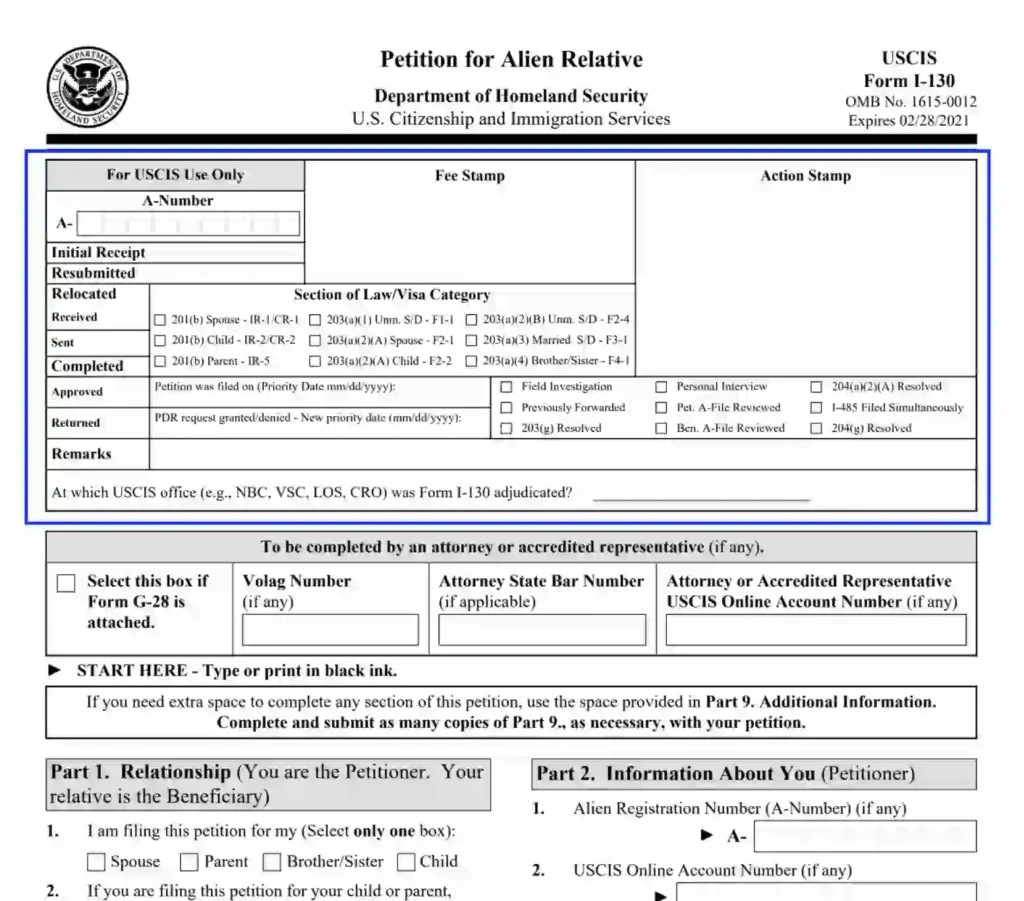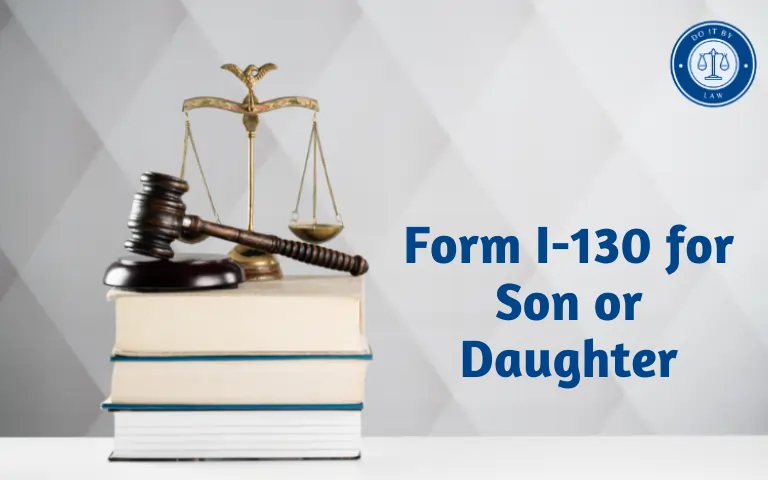Filling Out Form I-130 for the Son or Daughter (Married or Over 21) of U.S. Citizen
Form I-130 for Son or Daughter is the first step for U.S. citizens to sponsor certain family members who wish to immigrate to the United States. This includes petitioning for unmarried sons or daughters over the age of 21, or married sons or daughters of any age. Completing Form I-130 establishes the qualifying relationship between the petitioner and beneficiary, which must then be approved by U.S. Citizenship and Immigration Services (USCIS).
This article provides a step-by-step guide to filling out Form I-130 when petitioning for a son, daughter, or stepchild who is married or over 21 years old. It covers eligibility requirements, necessary documents, key form fields, filing tips, processing timelines, and other important information.
Who is Eligible to Petition for a Son or Daughter?
For a U.S. citizen to sponsor an adult son, daughter, or stepchild, the following eligibility conditions must be met:

- The petitioner must be a U.S. citizen, either by birth or naturalization.
- The sponsored beneficiary must be the petitioner’s biological child, adopted child, or stepchild.
- The son, daughter, or stepchild must be unmarried, over 21 years old, or married at any age.
- The beneficiary must currently reside outside the United States.
- With official documentation, the petitioner must prove their U.S. citizenship and relationship to the beneficiary’s son or daughter.
- Any prior immigration visa petition submitted for the beneficiary must have been withdrawn or resolved before refiling.
Documents Required With Form I-130
Petitioners should gather supporting documents to establish eligibility before filling out Form I-130. Required documents include:

- Proof of U.S. citizenship – birth certificate, naturalization certificate, unexpired U.S. passport.
- Government-issued photo ID – passport, driver’s license, state ID, or similar for petitioner.
- Proof of relationship – beneficiary’s birth certificate showing petitioner’s name, marriage certificate if stepchild.
- Proof of termination of any prior marriages – divorce decree, death certificate, annulment records.
- Copy of beneficiary’s passport – including biographical page with photograph.
- Two passport-style photos of the beneficiary.
- Filing fee – $420 via check, money order, or online payment with form G-1450.
If any required documents are unavailable, include a typed explanation of why with Form I-130.
Key Fields on Form I-130 to Complete
The petitioner must accurately fill out all fields on Form I-130 corresponding to their situation:

- Part 1: basic information on the petitioner and beneficiary, their relationship, and why filing.
- Part 2: additional information on the petitioner, their citizenship, and contact details.
- Part 3: spouse and prior marriage details for the petitioner if filing for a stepchild.
- Part 4: parents’ information, dates, and locations for the beneficiary.
- Part 5: additional information on the beneficiary, including passports, addresses, and prior immigration attempts.
- Part 6: petitioner’s statement of accuracy, signature, and contact information.
- Part 7: interpreter and preparer information and certification if applicable.
All questions must be answered thoroughly. Any mistakes could lead to delays or denial of the petition. Refer to USCIS instructions for clarification on any fields.
Tips for Filing Form I-130 for Son or Daughter
Follow these tips when completing and submitting Form I-130:
- Use the most recent version of Form I-130 from the USCIS website.
- Type responses instead of handwriting to ensure legibility.
- Make sure names match exactly on all forms and official documents.
- Double-check the accuracy of all dates provided on the form.
- Photocopy the completed petition and supporting documents for records.
- Obtain certified translations if documents are not in English.
- Arrange supplementary evidence if any required records are unavailable.
- Sign by hand with black ink on the printed form. Digital signatures are not accepted.
- Send the original signed I-130 by postal mail, not email or fax which is not permitted.
- Include a self-addressed stamped envelope to receive notifications from USCIS.
What Happens After Filing Form I-130?
Once USCIS receives the I-130 petition, the beneficiary will receive notices to complete additional forms, submit biometrics, and move through the visa process if approved. Typical next steps include:

- Receipt notice from USCIS confirming they received the petition.
- Requests to complete Form I-485 to adjust status while in the U.S. or Form DS-260 for consular processing if abroad.
- Biometrics appointment at a USCIS Application Support Center for fingerprints and photographs.
- Interview scheduling with a USCIS officer if applying from within the U.S.
- Further background checks by USCIS if the petition is approved.
- Visa interview scheduling at a U.S. consulate if applying from outside the U.S.
- Final decision on adjustment of status or approval to immigrate if all steps are complete.
How Long Does I-130 Processing Take?
Current I-130 processing times for a U.S. citizen sponsoring an unmarried son or daughter over 21 average around 11-32 months.
For a married son or daughter, processing times are typically 13-35 months.
Factors impacting the timeline include where the petition was filed, seasonal volume fluctuations, and any requests for additional evidence.
USCIS provides updated estimates on expected processing delays. Applicants can also check case status online using receipt numbers.
Common Reasons for I-130 Denial
Petitions for adult sons, daughters, or stepchildren are sometimes denied for reasons like:

- Failure to establish a blood relationship between petitioner and beneficiary.
- Missing proof of valid prior marriages and divorces if filing for a stepchild.
- Inconsistent or fraudulent information is provided on forms.
- Insufficient documentation of termination of any prior petitioned visa.
- Criminal issues or past immigration violations committed by the petitioner or beneficiary.
- Failure to prove valid U.S. citizenship of the petitioner.
Petitioners can reapply or file appeals if an I-130 is denied. However, denial significantly delays the process.
Conclusion
Filing Form I-130 is the essential first step for U.S. citizens to legally sponsor their adult sons, daughters, or stepchildren to immigrate to America. Paying close attention to eligibility rules, gathering needed documents, completing all technical details accurately, and maintaining compliance with laws throughout the process are crucial to successfully navigate the petition and the long journey to approval.





